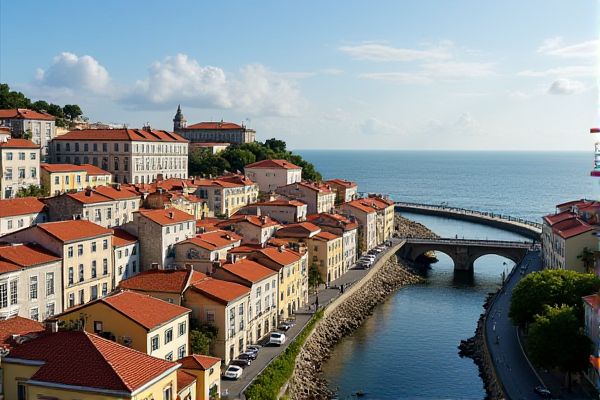
Moving to Portugal checklist: Obtain residency visa. Arrange health insurance. Secure accommodation. Open a Portuguese bank account. Understand Portuguese taxation. Set up utilities. Register for social security. Learn basic Portuguese. Enroll children in schools. Familiarize with local transportation.
Obtain residency visa.
To obtain a residency visa for Portugal, you must apply for a residence visa, which allows you to stay in Portugal for four months to submit an application for a residence permit at the SEF. You need to meet specific requirements, including a labour market test, and submit necessary documents such as a valid passport, proof of financial support, and a criminal record certificate. For more detailed information on the process, visit the Portugal Employed Worker Portal.
Arrange health insurance.
To arrange health insurance in Portugal, expats can either sign up with the public National Healthcare System (SNS) if they are employed or self-employed and paying social contributions, or purchase private health insurance from companies like Cigna, GeoBlue, AXA, or Allianz. This is particularly important for those who are not eligible for the SNS or prefer additional coverage and benefits. For more detailed information on securing appropriate healthcare plans, you can explore the Health Insurance options for guidance tailored to expats in Portugal.
Secure accommodation.
To secure accommodation in Portugal, determine whether to rent or buy, considering factors like upfront costs and renovation needs. Use local property portals like Imovirtual, Idealista, and CasoSapo to search for properties, and ensure you read the lease agreement thoroughly, including details on rent, security deposits, and property responsibilities. For more detailed guidance, consult resources such as the Moving To Portugal For Expats article, which offers valuable insights for individuals planning a move. Thorough research and understanding of local real estate practices will aid in making informed decisions when securing a new home in Portugal.
Open a Portuguese bank account.
To open a Portuguese bank account, you first need to obtain a Portuguese NIF (Numero de Identificacao Fiscal) by visiting your local tax office with your passport and proof of address. Once you have your NIF, gather the required documents such as proof of ID, proof of address, and proof of employment. You can then visit a local bank branch or opt for an online application process if available. This streamlined process ensures you're ready to manage your finances effectively in Portugal.
Understand Portuguese taxation.
To understand Portuguese taxation, note that non-resident foreigners are taxed at a flat rate of 25% on Portuguese-sourced income, while residents are taxed on their worldwide income at progressive rates from 14.5% to 48%. The Non-Habitual Residency (NHR) program, though ending as of January 2024, previously offered a flat 20% tax rate or exemptions for certain foreign income over a ten-year period. For a comprehensive overview, visit the Taxes in Portugal page to explore the various aspects and benefits that have shaped the current taxation landscape.
Set up utilities.
Setting up utilities in Portugal involves choosing your preferred electricity, gas, and water suppliers and gathering necessary documents such as identification, NIF, proof of address, and bank details. Once your documents are ready, contact the providers to initiate the connection process, which can often be done online, by phone, or in person. It is important to ensure that access is provided to the property for meter readings and installations. Additionally, consider comparing different providers for the best tariffs and services. For more detailed guidance on this process, visit Portugal Residency Advisors for expert advice and information.
Register for social security.
To register for a Social Security Number (NISS) in Portugal, it is essential to first register with the Portuguese Tax Authority and obtain a valid Residence Permit. You must then apply in person at a Social Security office. During the application process, you will need to provide various documents including your passport, Residence Permit, tax identification number, and employment contract. For comprehensive guidance, you can visit the Bleisured website, which offers detailed instructions and advice to help you navigate this process smoothly. Ensuring these prerequisites are fulfilled will aid in the successful acquisition of your NISS in Portugal.
Learn basic Portuguese.
To prepare for moving to Portugal, learning basic Portuguese is crucial for everyday life, such as shopping and communicating with colleagues. You can use various resources like language apps, online courses, and language schools to learn the local language.
Enroll children in schools.
To enroll children in schools in Portugal, one can use the online Portal das Matriculas, where necessary documents such as ID cards, residence certificates, and tax identification numbers must be submitted. It is important to adhere to specific enrollment deadlines which vary by grade level to ensure a smooth registration process.
Familiarize with local transportation.
To familiarize yourself with local transportation in Portugal, understand that major cities like Lisbon and Porto have extensive public transport options including metro, buses, trams, and trains. While trains and long-distance coaches connect major cities, local buses and taxis are necessary for smaller towns and villages, and renting a car may be essential for rural areas. For more comprehensive information, consider exploring the Portugalist website, which offers valuable insights into public transport across the region.
